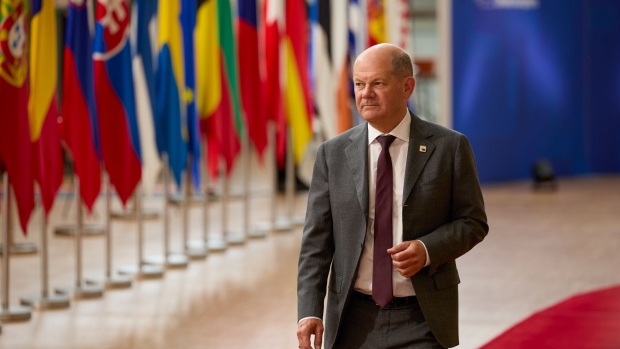Jun 27, 2024
Germany Irks EU Leaders by Opposing Talks on How to Fund Defense
, Bloomberg News

(Bloomberg) -- Germany pushed European Union leaders to drop language on joint defense spending, despite opposition from other member states that believe extra resources are needed to ramp up the bloc’s capabilities.
EU leaders meeting Thursday at a summit in Brussels agreed on their strategic priorities for the next five years, which includes the goals of strengthening security and defense. But Chancellor Olaf Scholz stood by Germany’s opposition to more joint spending to cover the bloc’s capability gaps at a time when its domestic budget is strained.
“I had one concern,” Scholz told reporters after the summit. “Do I want to accept that we issue sovereign bonds, so-called euro bonds, for defense financing? The answer is no. Do I want to propose that national defense budgets can be refinanced from the budget of the European Union? The answer is no.”
Some leaders were taken aback that, in the midst of the war Ukraine, Germany, with support from the Netherlands, would block progress on financing options rather than discussing how to scale up and hasten a defense buildup. according to a person familiar with the discussions.
During a heated discussion, some leaders including from Denmark and Poland pointed out that it was a good thing that neither Russia nor Ukrainian President Volodymyr Zelenskiy were in the room to hear them debate whether the EU should finance more defense spending, said people with knowledge of the talks, who were granted anonymity to describe private discussions.
Scholz can count on support from the Netherlands’s outgoing prime minister, Mark Rutte, in a push to block any progress on financing. Both have been fighting against additional European resources, including joint debt, before other options are exhausted.
The stance by Rutte, who will become the next NATO secretary general, to delay progress on financing is shocking given his next job, according to one EU diplomat. The Hague, however, wants a clear assessment of needs, an improvement in the internal market for defense, better procurement and to facilitate access to private capital before using European funds.
European Commission President Ursula von der Leyen said after the talks that the EU needs an additional €500 billion ($535 billion) of investment in defense over the next 10 years.
Germany’s opposition won’t put an end to discussions about how to boost the bloc’s defense readiness and capabilities in the face of Russia’s invasion on Ukraine and rising geopolitical risks, according to EU diplomats. France and Italy are among the EU nations that have called for some kind of joint borrowing.
“We need to spend more and coordinate on defense initiatives within the EU and with NATO, which remains the foundation of collective defense, combining our capabilities to protect, deter and defend our people and our territory,” the prime ministers of Estonia, Latvia, Lithuania and Poland wrote in a letter to European Council President Charles Michel and European Commission President Ursula von der Leyen before the summit.
Resolving the financing issue will be one of the biggest challenges the EU will face during the next commission’s tenure. Von der Leyen, who was nominated for a second term, gave up on her plan to present a report this week on financing options to strengthen the bloc’s defense capabilities and instead presented an oral update on what projects they could jointly cover.
The budget debate is particularly sensitive in Germany at the moment, with Scholz’s ruling coalition negotiating bitterly about how to set spending priorities in next year’s federal budget with tax revenues coming in weaker than expected.
For the EU’s eastern countries, an assessment of needs is seen as a key step. Funds available under the EU budget aren’t enough given the projected costs — Poland has put a €2.5 billion price tag on strengthening its 700-kilometer (435-mile) border with Belarus and Russian exclave of Kaliningrad.
“We need a defense initiative to protect Europeans today and in the years to come,” the four eastern leaders said in the letter. “Building a defense infrastructure system along the EU external border with Russia and Belarus will address the dire and urgent need to secure the EU from military and hybrid threats.”
--With assistance from Alberto Nardelli.
(Updates with comment from German chancellor in third paragraph)
©2024 Bloomberg L.P.







